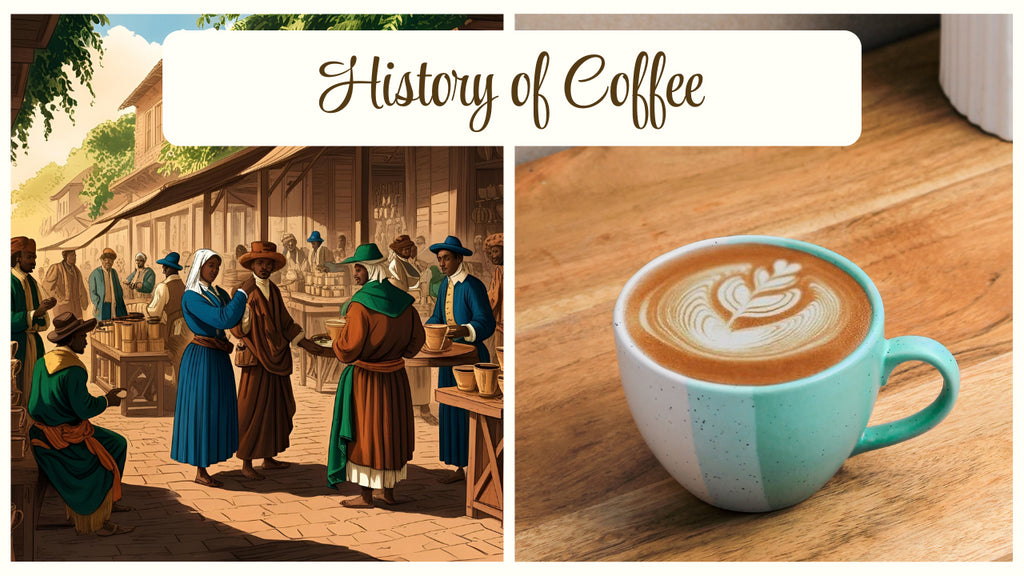History of Coffee: How a Bean Changed the World
Posted by MARKETING TES

Origin and History of Coffee: A Brew-tiful Journey
Have you ever wondered about the origin of coffee — that magical beverage that fuels your mornings and late-night work sessions? From ancient legends in Ethiopia to bustling coffeehouses across the globe, the history of coffee is as rich and complex as its flavor. Grab your favorite brew and join us on a journey through time.
The Legendary Origin of Coffee in Ethiopia
The story of coffee begins in the 9th century in the highlands of Ethiopia, where a goat herder named Kaldi discovered the energizing effects of coffee berries. His goats, after nibbling the red cherries from a wild shrub, became unusually lively. Curious, Kaldi tried them himself and felt a sudden burst of energy.
This discovery didn’t stay a secret for long. Local monks began brewing these beans into a drink to help them stay awake during long prayers. Thus, the first chapter of the coffee origin story was born.
The Rise of Coffee in the Arab World
By the 15th century, coffee had traveled to Yemen, where it became central to Sufi religious practices. The beans were roasted and brewed much like they are today. The port of Mocha (yes, like the mocha latte!) became a major hub for the coffee trade, spreading the beverage across Arabia, Egypt, and Persia.
Coffee wasn’t just a drink — it was a cultural revolution. Coffeehouses (known as qahveh khaneh) emerged as social centers where people gathered to talk, listen to music, and exchange ideas. These were the world’s first coffee shops, shaping what we now call coffee culture.
Coffee Spreads to Europe
In the 17th century, coffee made its way to Europe, quickly gaining popularity in cities like Venice, Paris, London, and Vienna. Though initially controversial — some clergy even labeled it the “bitter invention of Satan” — coffee won favor when Pope Clement VIII blessed it.
Europe saw a boom in coffeehouses, often referred to as “penny universities” for the intellectual discussions they encouraged. These cafes became centers of business, politics, and culture — much like modern-day coworking cafes.
Global Coffee Cultivation Begins
As demand grew, colonial powers began cultivating coffee in tropical regions. The Dutch planted it in Java (Indonesia), the French brought it to the Caribbean, and the Portuguese introduced it to Brazil, which would eventually become the world’s largest coffee producer.
This global spread turned coffee into a major commodity and shaped economies across continents.
Coffee in the Modern World
Today, coffee is a global phenomenon. From artisanal pour-overs and nitro brews to instant coffee and café culture, it’s hard to imagine a world without it. The rise of third-wave coffee emphasizes quality, sustainability, and the stories behind each bean.
Whether you're sipping espresso in Italy, enjoying filter coffee in South India, or grabbing a cold brew on the go, you're participating in a centuries-old tradition.
Final Sip: A Global Legacy in Every Cup
The history of coffee is a tale of discovery, trade, culture, and connection. From a curious goat herder in Ethiopia to your favorite local café, coffee has transformed how we socialize, work, and relax.
So the next time you sip that latte or black brew, remember — you're tasting history in every cup.
Frequently Asked Questions (FAQs)
Q1: Where did coffee originate?
Coffee originated in Ethiopia, where wild coffee trees still grow.
Q2: What is the oldest coffeehouse in the world?
One of the oldest is Kiva Han in Constantinople (modern-day Istanbul), established in the 15th century.
Q3: How did coffee reach Europe?
Coffee spread from the Arab world to Europe via trade routes and was embraced by European cities in the 1600s.
Q4: What is third-wave coffee?
Third-wave coffee focuses on quality, sustainability, and a deep appreciation for the story behind each coffee bean.


